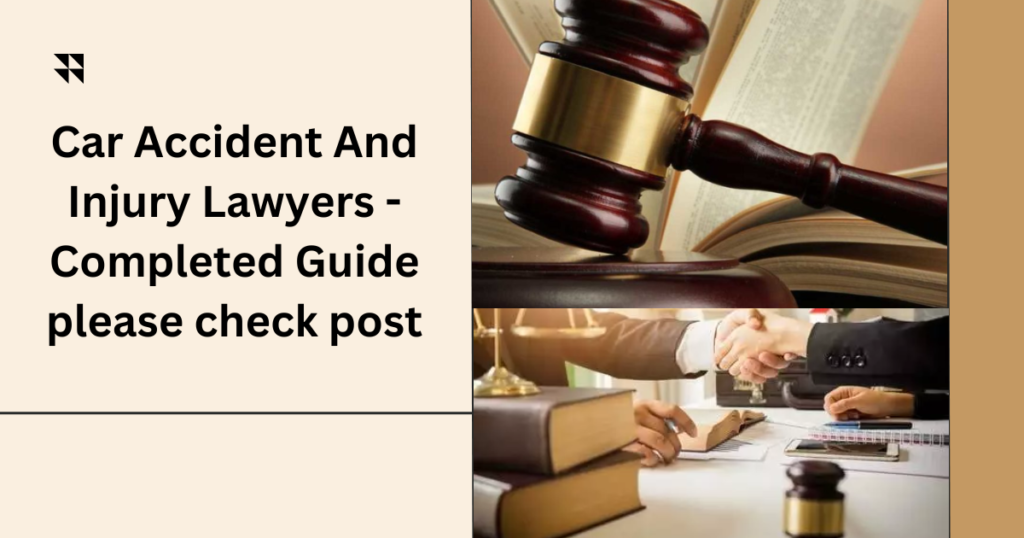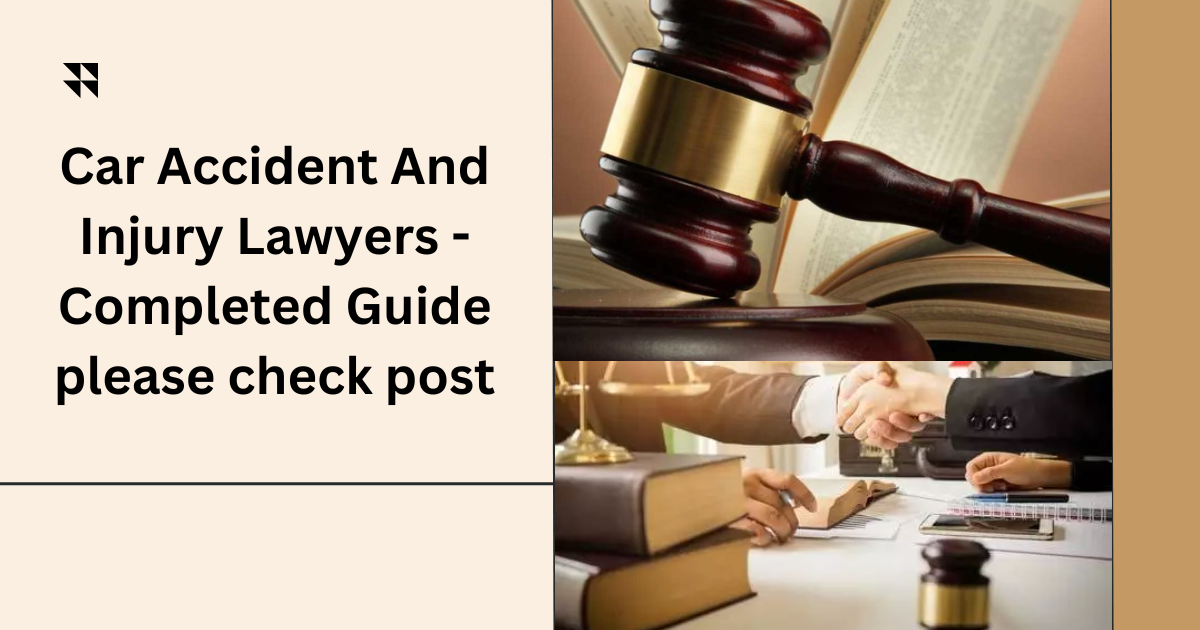Car accidents can be traumatic experiences that often lead to physical injuries, emotional distress, and financial burdens. Navigating the aftermath of a car accident can be challenging, especially when dealing with insurance claims, medical bills, and potential legal issues. This comprehensive guide aims to provide you with essential information about car accident and injury lawyers, their role, and how they can help you secure the compensation you deserve.

Car Accident and Injury Lawyers
Who Are Car Accident Lawyers?
Car accident lawyers, also known as personal injury lawyers, specialize in cases involving motor vehicle accidents. They represent clients who have been injured or suffered damages due to the negligence or wrongdoing of another party. These legal professionals are well-versed in the complexities of traffic laws, insurance policies, and personal injury claims.
Role of Car Accident Lawyers
The primary role of car accident lawyers is to advocate for their clients’ rights and interests. They handle various tasks, including:
- Investigating the Accident: Gathering evidence, such as police reports, witness statements, and medical records, to build a strong case.
- Negotiating with Insurance Companies: Communicating with insurance adjusters to negotiate fair settlements.
- Filing Lawsuits: Preparing and filing legal documents if a lawsuit becomes necessary.
- Representing Clients in Court: Advocating for clients during court proceedings, if required.
- Providing Legal Advice: Offering guidance on the best course of action and helping clients understand their legal options.
When to Hire a Car Accident Lawyer
It is advisable to hire a car accident lawyer in the following situations:
- Serious Injuries: If you or a loved one has sustained severe injuries that require extensive medical treatment and rehabilitation.
- Disputed Liability: When there is a disagreement about who is at fault for the accident.
- Insurance Issues: If the insurance company is refusing to pay a fair settlement or denying your claim altogether.
- Complex Cases: In cases involving multiple parties, such as multi-vehicle accidents or accidents involving commercial vehicles.
Steps to Take After a Car Accident
Immediate Actions at the Accident Scene
- Ensure Safety: Move to a safe location and check for injuries. Call emergency services if necessary.
- Call the Police: Report the accident to the police and request an official accident report.
- Exchange Information: Collect contact and insurance information from all involved parties.
- Document the Scene: Take photos and videos of the accident scene, vehicle damage, and any visible injuries.
- Speak to Witnesses: Obtain contact information and statements from any witnesses.
Post-Accident Steps
- Seek Medical Attention: Visit a doctor for a thorough examination, even if you feel fine initially. Some injuries may not be immediately apparent.
- Notify Your Insurance Company: Report the accident to your insurance provider and provide them with the necessary details.
- Keep Records: Maintain detailed records of medical treatments, expenses, and any communications with insurance companies.
- Consult a Car Accident Lawyer: Schedule a consultation with a car accident lawyer to discuss your case and explore your legal options.
The Legal Process in Car Accident Cases
Initial Consultation
The first step in the legal process is scheduling an initial consultation with a car accident lawyer. During this meeting, the lawyer will review the details of your case, assess the strength of your claim, and advise you on the next steps. This consultation is usually free of charge.
Investigation and Evidence Gathering
Once you hire a lawyer, they will begin a thorough investigation of the accident. This involves:
- Collecting Evidence: Gathering police reports, medical records, witness statements, and any available video footage.
- Consulting Experts: Working with accident reconstruction experts, medical professionals, and other specialists to build a strong case.
- Reviewing Insurance Policies: Analyzing insurance policies to determine coverage and identify potential sources of compensation.
Demand Letter and Negotiations
After gathering sufficient evidence, your lawyer will draft a demand letter to the at-fault party’s insurance company. This letter outlines the details of the accident, the extent of your injuries and damages, and the compensation you are seeking. The insurance company will review the demand letter and may either accept, reject, or negotiate the settlement amount.
Filing a Lawsuit
If negotiations fail to result in a fair settlement, your lawyer may advise you to file a lawsuit. This involves:
- Preparing Legal Documents: Drafting and filing a complaint in the appropriate court.
- Serving the Defendant: Notifying the at-fault party of the lawsuit.
- Discovery Process: Both parties exchange evidence and information related to the case.
- Pre-Trial Motions: Lawyers may file motions to resolve certain issues before the trial begins.
Trial and Settlement
If the case proceeds to trial, both sides will present their evidence and arguments before a judge or jury. The trial process includes:
- Opening Statements: Each side presents an overview of their case.
- Presentation of Evidence: Witnesses testify, and evidence is presented to support each side’s claims.
- Closing Arguments: Lawyers summarize their case and highlight key points.
- Verdict: The judge or jury renders a decision based on the evidence and arguments presented.
In many cases, a settlement may be reached before the trial concludes. If a verdict is rendered, it will determine the amount of compensation you receive.
Types of Compensation in Car Accident Cases
Economic Damages
Economic damages are tangible, quantifiable losses that result from the accident. They include:
- Medical Expenses: Costs for hospital stays, surgeries, medications, physical therapy, and ongoing medical care.
- Lost Wages: Income lost due to time off work during recovery.
- Property Damage: Costs to repair or replace your vehicle and any other damaged property.
- Future Economic Losses: Projected future medical expenses and loss of earning capacity.
Non-Economic Damages
Non-economic damages are intangible losses that do not have a specific monetary value. They include:
- Pain and Suffering: Physical pain and emotional distress resulting from the accident and injuries.
- Loss of Consortium: Impact on relationships with family members, such as loss of companionship or support.
- Mental Anguish: Psychological impact, such as anxiety, depression, or post-traumatic stress disorder (PTSD).
Punitive Damages
In cases involving egregious or reckless behavior by the at-fault party, punitive damages may be awarded. These are intended to punish the wrongdoer and deter similar conduct in the future.
Choosing the Right Car Accident Lawyer
Qualifications and Experience
When selecting a car accident lawyer, consider their qualifications and experience. Look for:
- Specialization: Lawyers who specialize in personal injury and car accident cases.
- Track Record: A history of successful case outcomes and settlements.
- Credentials: Membership in professional organizations, such as the Association of Personal Injury Lawyers (APIL).
Client Reviews and Testimonials
Client reviews and testimonials can provide valuable insights into a lawyer’s reputation and client satisfaction. Check online review platforms and ask for references from previous clients.
Communication and Availability
Effective communication is crucial in legal cases. Ensure the lawyer you choose is accessible, responsive, and keeps you informed about the progress of your case.
Fee Structure
Understand the lawyer’s fee structure before hiring them. Many personal injury lawyers work on a contingency fee basis, meaning they only get paid if you win your case. Clarify any additional costs, such as court fees or expert witness fees.
Frequently Asked Questions
What Should I Do Immediately After a Car Accident?
- Ensure safety and call emergency services.
- Report the accident to the police and obtain an official report.
- Exchange information with other parties involved.
- Document the accident scene with photos and videos.
- Seek medical attention, even if injuries are not immediately apparent.
- Notify your insurance company.
How Much Does It Cost to Hire a Car Accident Lawyer?
Most car accident lawyers work on a contingency fee basis, meaning they only get paid if you win your case. The fee is usually a percentage of the settlement or court award, typically ranging from 25% to 40%.
How Long Do I Have to File a Car Accident Claim?
The time limit to file a car accident claim, known as the statute of limitations, varies by jurisdiction. In the UK, the general time limit for personal injury claims is three years from the date of the accident.
What If the Other Driver Is Uninsured or Underinsured?
If the at-fault driver is uninsured or underinsured, you may still be able to recover compensation through your own insurance policy, specifically if you have uninsured/underinsured motorist coverage.
Can I Handle a Car Accident Claim Without a Lawyer?
While it is possible to handle a car accident claim without a lawyer, it is not advisable, especially in complex cases. A lawyer can navigate the legal intricacies, negotiate with insurance companies, and ensure you receive fair compensation.
What Is the Average Settlement for a Car Accident Claim?
The average settlement for a car accident claim varies widely based on factors such as the severity of injuries, property damage, and liability. Settlements can range from a few thousand to several million pounds.
Please Read More: Truck accident lawyers near me and best United states.
Please Read More: cleveland mesothelioma attorney in north carolina
Conclusion
I hope that you would have liked some other posts. Friend, if you liked this post, then you must like this post and share it with your friends. I know that you would have liked the given information very much. If you are related to this question, If you have any questions, please leave a leave a comment.
